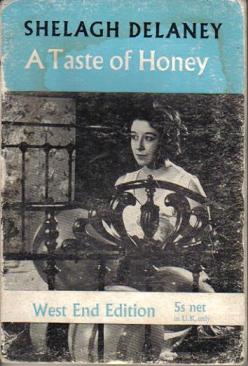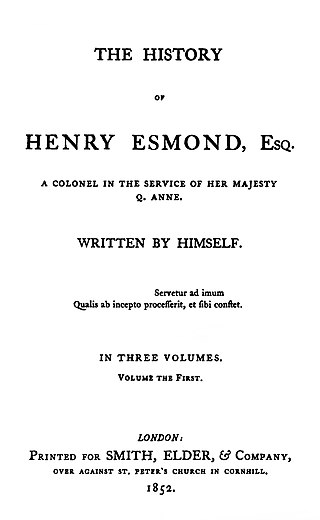Related Research Articles

Sense and Sensibility is the first novel by the English author Jane Austen, published in 1811. It was published anonymously; By A Lady appears on the title page where the author's name might have been. It tells the story of the Dashwood sisters, Elinor and Marianne as they come of age. They have an older half-brother, John, and a younger sister, Margaret.

William Makepeace Thackeray was an English novelist and illustrator. He is known for his satirical works, particularly his 1847–1848 novel Vanity Fair, a panoramic portrait of British society, and the 1844 novel The Luck of Barry Lyndon, which was adapted for a 1975 film by Stanley Kubrick.

Vanity Fair is a novel by the English author William Makepeace Thackeray, which follows the lives of Becky Sharp and Amelia Sedley amid their friends and families during and after the Napoleonic Wars. It was first published as a 19-volume monthly serial from 1847 to 1848, carrying the subtitle Pen and Pencil Sketches of English Society, which reflects both its satirisation of early 19th-century British society and the many illustrations drawn by Thackeray to accompany the text. It was published as a single volume in 1848 with the subtitle A Novel without a Hero, reflecting Thackeray's interest in deconstructing his era's conventions regarding literary heroism. It is sometimes considered the "principal founder" of the Victorian domestic novel.

The Luck of Barry Lyndon is a picaresque novel by English author William Makepeace Thackeray, first published as a serial in Fraser's Magazine in 1844, about a member of the Irish gentry trying to become a member of the English aristocracy. Thackeray, who based the novel on the life and exploits of the Anglo-Irish rake and fortune-hunter Andrew Robinson Stoney, later reissued it under the title The Memoirs of Barry Lyndon, Esq. The novel is narrated by Lyndon himself, who functions as a quintessentially unreliable narrator.

The Upper Hand is a British television sitcom with dramatic elements broadcast by ITV from 1 May 1990 to 14 October 1996. The programme was adapted from the American sitcom Who's the Boss?

A Taste of Honey is the first play by the British dramatist Shelagh Delaney, written when she was 19. It was adapted into an award-winning film of the same title in 1961.

The History of Pendennis: His Fortunes and Misfortunes, His Friends and His Greatest Enemy (1848–50) is a novel by the English author William Makepeace Thackeray. It is set in 19th-century England, particularly in London. The main hero is a young English gentleman Arthur Pendennis, who is born in the country and sets out for London to seek his place in life and society. As such, it is generally categorized as a bildungsroman. The novel took two years for Thackeray to write and, in line with other Thackeray works, most notably Vanity Fair, it offers an insightful and satiric picture of human character and aristocratic society. The characters include the snobbish social hanger-on Major Pendennis and the tipsy Captain Costigan.

The History of Henry Esmond is a historical novel by William Makepeace Thackeray, originally published in 1852. The book tells the story of the early life of Henry Esmond, a colonel in the service of Queen Anne of England. A typical example of Victorian historical novels, Thackeray's work of historical fiction tells its tale against the backdrop of late 17th- and early 18th-century England – specifically, major events surrounding the English Restoration – and utilises characters both real and imagined. It weaves its central character into a number of events such as the Glorious Revolution, the War of the Spanish Succession, the Hamilton–Mohun Duel and the Hanoverian Succession.

The Trickster of Seville and the Stone Guest is a play traditionally attributed to Tirso de Molina, although several scholars now attribute it to Andrés de Claramonte. Its title varies according to the English translation, and it has also been published under the titles The Seducer of Seville and the Stone Guest and The Playboy of Seville and the Stone Guest. The play was first published in Spain around 1630, though it may have been performed as early as 1616. Set in the 14th century, the play is the earliest fully developed dramatisation of the Don Juan legend.
The Wedding is a Caroline era stage play, a comedy written by James Shirley. Published in 1629, it was the first of Shirley's plays to appear in print. An early comedy of manners, it is set in the fashionable world of genteel London society in Shirley's day.

Rebecca "Becky" Sharp, later describing herself as Rebecca, Lady Crawley, is the main protagonist of William Makepeace Thackeray's 1847–48 novel Vanity Fair. She is presented as a cynical social climber who uses her charms to fascinate and seduce upper-class men. This is in contrast with the clinging, dependent Amelia Sedley, her friend from school. Becky then uses Amelia as a stepping stone to gain social position. Sharp functions as a picara—a picaresque heroine—by being a social outsider who is able to expose the manners of the gentry to ridicule.
Women Pleased is a late Jacobean era stage play, a tragicomedy by John Fletcher that was originally published in the first Beaumont and Fletcher folio of 1647.
The Damoiselle, or the New Ordinary is a Caroline era stage play, a comedy by Richard Brome that was first published in the 1653 Brome collection Five New Plays, issued by Humphrey Moseley, Richard Marriot, and Thomas Dring.

John Willoughby is a fictional character in Jane Austen's 1811 novel Sense and Sensibility. He is described as being a handsome young man with a small estate, but has expectations of inheriting his aunt's large estate. He is in love with Marianne Dashwood, who is also a character in the novel.

The Adventures of Philip on his Way Through the World: Shewing Who Robbed Him, Who Helped Him, and Who Passed Him By is the final novel by the English author William Makepeace Thackeray, originally published in 1861–1862. It was the last novel Thackeray completed, and harks back to several of his previous ones, involving as it does characters from A Shabby Genteel Story and being, like The Newcomes, narrated by the title character of his Pendennis. In recent years it has not found as much favour from either readers or critics as Thackeray's early novels.

Young Goethe in Love is a 2010 German historical drama film directed by Philipp Stölzl and starring Alexander Fehling, Miriam Stein, and Moritz Bleibtreu. It is a fictionalized version of the early years of the poet Johann Wolfgang von Goethe and the events forming the basis of his novel The Sorrows of Young Werther.
The Making of a Lady is a television film based on the 1901 novel The Making of a Marchioness by Frances Hodgson Burnett that uses a screenplay adaptation by Kate Brooke. The film premiered in 2012 on ITV in Britain and was subsequently broadcast on PBS in the United States in 2014.

Il Piacere (Pleasure) is the first novel by Gabriele D'Annunzio, written in 1889 at Francavilla al Mare, and published the following year by Fratelli Treves. Beginning in 1895, the novel was republished with the heading I Romanzi della Rosa, forming a narrative cycle including The Intruder, and Triumph of Death.
References
- ↑ The character is named after a type of paintbrush used by artists. 'fitch, n.2: A brush made of the hair of a fitchew or polecat; also, a small brush made of hog's hair' . OED Online. June 2013. Oxford University Press.
- ↑ A 'tuft-hunter' was university slang for a toady or sycophant.(At Oxford and Cambridge titled undergraduates wore gold tassels or 'tufts' in their caps). OED online. June 2013. Oxford University Press.
